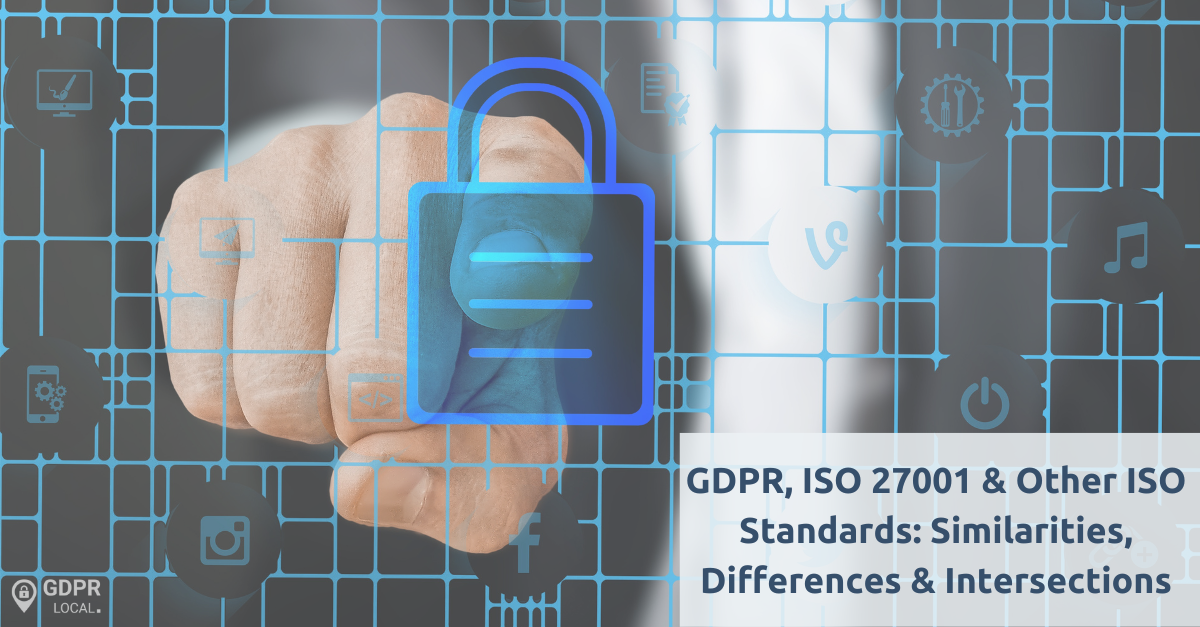
GDPR, ISO 27001 & Other ISO Standards: Similarities, Differences & Intersections
What’s the relationship between GDPR, ISO 27001 and other ISO standards? In today’s blog, we look at the similarities, differences and connections.
You don’t need us to remind you of the importance of safeguarding sensitive information in today’s interconnected digital world. It’s the reason standards like ISO 27001 and legislation such as the General Data Protection Regulation (GDPR) exist.
It’s important for every data-reliant business to understand these frameworks because they are the key to ensuring compliance and data security. It’s also important to understand the connections between ISO 27001 and GDPR, and in this post we’ll highlight three key similarities, two notable distinctions, and explore how they connect with other ISO standards.
Similarities between ISO 27001 and GDPR
Data Protection at the Core
Both ISO 27001 and GDPR place data protection at their heart. ISO 27001, an information security management system (ISMS) standard, ensures that organisations have robust controls in place to safeguard sensitive information. GDPR is a comprehensive regulation that specifically focuses on protecting personal data and ensuring the rights of individuals.
Risk-Based Approach
Both frameworks advocate a risk-based approach. ISO 27001 requires organisations to conduct a thorough risk assessment and implement controls to mitigate identified risks. Similarly, GDPR mandates data controllers and processors to assess risks to data subjects’ rights and freedoms and take appropriate measures to mitigate those risks.
Continuous Improvement
ISO 27001 and GDPR promote a culture of continuous improvement. ISO 27001 requires organisations to establish, implement, maintain, and continually improve an ISMS, a centrally managed repository of information security practices. GDPR enforces the principle of accountability, encouraging organisations to regularly review and enhance their data protection processes.
Differences between ISO 27001 and GDPR
Scope and Focus
ISO 27001 is broader in scope than GDPR, encompassing all types of information that an organisation handles. Its focus is not solely limited to personal data (it addresses the protection of all information assets) and its primary purpose is to protect the business. GDPR, on the other hand, is specifically designed to protect personal data and safeguard the privacy rights of individuals.
Legal Framework vs. Voluntary Standard
GDPR is a legal regulation enforced by governmental bodies, carrying legal obligations and potential fines for non-compliance. ISO 27001, while internationally recognised, is a voluntary standard. Organisations adopt it based on their commitment to information security and their desire to demonstrate compliance to stakeholders.
If We Comply with ISO 27001, Are We Automatically GDPR Compliant too?
No. GDPR and ISO 27001 mapping can be extremely valuable here. It helps organisations understand what data they hold, what they use that data for, where they store it and what happens when they no longer need it.
It’s certainly true that, through GDPR and ISO 27001 mapping, you can reduce the effort in complying with both standards because you will find areas of crossover. But you shouldn’t assume that full compliance with one standard confers full compliance with another. It won’t, not least because, as we’ve already seen, the two have very different purposes.
Connecting ISO 27001 and GDPR with Other ISO Standards
Many organisations find that the process of complying with ISO 27001 and GDPR reveals synergies with other compliance standards.
ISO 9001, the Quality Management Systems (QMS) standard, has clear synergies with GDPR and especially ISO 27001. The process-oriented approach of ISO 9001 aligns well with the systematic approach to information security of ISO 27001. By integrating QMS with ISMS, organisations can enhance efficiency, quality, and security in tandem.
ISO 22301 (Business Continuity Management System) complements ISO 27001 by ensuring that organisations can effectively respond to disruptions and protect critical operations and data. GDPR, with its focus on the rights of data subjects, aligns closely with the principles of ISO 22301 in ensuring that organisations can continue operations even during unforeseen events.
Removing the Complexity of Compliance
On the one hand, the interconnected nature of business legislation and standards can make compliance easier. With a clear understanding of the similarities and differences between GDPR, ISO 27001 and other ISO standards, you can take advantage of the synergies between them to make compliance less arduous and your data more secure.
On the other hand, the web of standards and legislation can appear overwhelming, making it difficult for organisations to fully understand where they are and where they need to go next. GDPR Local helps organisations build a comprehensive framework of data security that protects you, protects data subjects and helps lock in operational resilience.
Where Can We Find More?
You’ll find more about the specific standards here:
Guide to the General Data Protection Regulation (EU version)
Guide to the General Data Protection Regulation (UK version)
The official ISO 27001 ISMS Standard
And find expert help in managing your data protection here, or by calling +44 1772 217800.